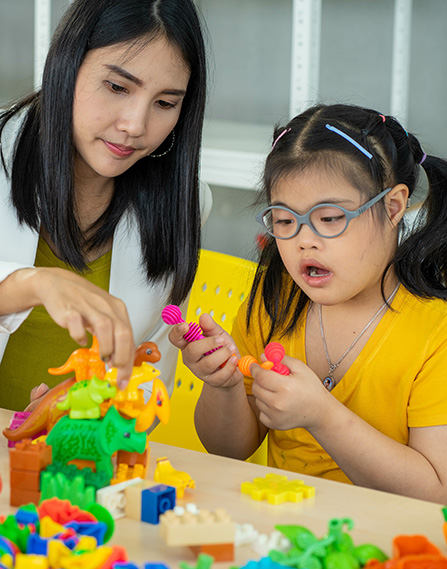Get started with Mizzou
Apply hereGraduate Certificate
You are one of the helpers. You look to make a difference in the lives of others, giving of yourself in service to the common good. Making a difference in individuals’ lives and in your community is part of what drives you. That calling has led you toward a career helping others. Whether through education, advocating for others or providing effective, ethical behavior analytic care and support, you strive to improve your community. You especially focus on those with learning challenges, developmental disabilities or other difficulties that necessitate modifications to learning strategies or daily living.
The Graduate Certificate in Applied Behavior Analysis program from Mizzou’s College of Education and Human Development is just what you’re looking for. Through this program, the renowned faculty of the Department of Special Education guides you in honing your skills and conducting research that will change lives. Whether your chosen setting is a school, clinic, a patient’s home or elsewhere, you will learn how best to provide support to individuals across a spectrum of needs and make you a competent leader, advocate and collaborator within the behavior analysis field.
About the applied behavior analysis program
This graduate certificate is a blended program. You will complete about half of your coursework online, while completing the other half in person.
Should you wish to complete this program fully remote, you must have your advisor’s permission to do so. You will also need to complete your practicum at one of Mizzou’s supervised learning sites in St. Louis, Columbia, Kansas City, Jefferson City, Springfield or Cape Girardeau.
The graduate certificate in applied behavior analysis program provides you the choice to accrue fieldwork hours toward Board Certified Behavior Analyst® (BACB®) licensure at one of our supervised learning sites or independently from Mizzou. This program is a verified course sequence via the Association for Behavior Analysis International (ABAI©).
One of this program’s partner sites is the Thompson Center for Autism and Neurodevelopment. This state-of-the-art facility is dedicated to clinical service, research and training to improve the lives of individuals with autism and other neurodevelopmental disorders.
Quick facts
Official name
Graduate Certificate in Applied Behavior AnalysisCampus
Program type
Graduate certificateAcademic home
College of Education & Human Development | Department of Special EducationDelivery mode
Blended, some campus visits requiredAccreditation
Higher Learning Commission, Association for Behavior Analysis InternationalCredit hours
24Estimated cost
$14,157.60*This cost is for illustrative purposes only. Your hours and costs will differ, depending on your transfer hours, your course choices and your academic progress. See more about tuition and financial aid.

Career prospects
Graduates of this certificate program can obtain job titles such as:
- Board Certified Behavior Analyst® (BCBA®)*
- Licensed Behavior Analyst*
- Clinical director
- Program director
- Instructor
* Requires a separate certification not included in this program.
Program structure
This graduate certificate consists of 24 credit hours taught in a hybrid format. All courses are synchronous. Half of the courses are offered online, while the other half are in person. It is possible you may be allowed to pursue this program completely online if you are completing your practicum at one of Mizzou’s supervised learning sites and have your advisor’s approval.
Completing this certificate program will make you eligible to sit for the Board Certified Behavior Analyst® certification exam. This exam is administered by the Behavior Analyst Certification Board®.
Our program’s goals are to:
- Equip students with the scientific and analytical skills necessary for designing and implementing effective behavior analytic interventions.
- Develop competence in the conceptual foundations of ABA to ensure students can apply these principles effectively across various settings.
- Teach students to deliver behavior analytic services in an ethical and culturally responsive manner, recognizing and respecting the diverse backgrounds and needs of the communities they serve.
- Foster research competency by having students engage in research activities that contribute to the advancement of ABA knowledge and practices, promoting a culture of inquiry and innovation.
- Develop collaboration and leadership skills that promote active participation in professional communities.
Coursework includes
- Behavior analysis foundations
- Advanced studies in a single subject
- Creating individualized assessments
- Ethics in the field
Review all requirements for the online Graduate Certificate in Applied Behavior Analysis program.
Delivery
Blended, some campus visits requiredCalendar system
Semester-basedTypical program length
2 yearsTypical course load
2-3 classesAccreditation
The University of Missouri is accredited by the Higher Learning Commission, one of six regional institutional accreditors in the United States. This program is a verified course sequence via the Association for Behavior Analysis International (ABAI©).
Faculty spotlight

Kate Sadler is a Board Certified Behavior Analyst ®, Licensed Behavior Analyst and assistant teaching professor in the College of Education and Human Development at the University of Missouri. Dr. Sadler’s research investigates methods of improving outcomes for patients and developing supports for individuals impacted by emotional, behavioral and/or neurodevelopmental disabilities across the lifespan.

Rose Osanayra is a Board Certified Behavior Analyst ® and professor in the College of Education and Human Development at the University of Missouri. Dr. Osanayra’s research focuses on increasing access to effective interventions for individuals with autism and developmental disabilities.

Jena Randolph is an assistant research professor and the training and education division director with the University of Missouri’s Thompson Center for Autism and Neurodevelopment. Her experience has a focus on collaborative and coordinated care for individuals with autism and developmental disabilities. She is one of the primary developers of the Training Experts in Autism for Missouri (TEAM) program, which provides autism training and support to professionals across disciplines throughout the state and of the Self-Determined Transition Readiness through Individual Vocational Experiences (STRIVE) program, which provides direct instruction, work experiences and peer mentorship to enhance employment readiness for young adults with autism.
